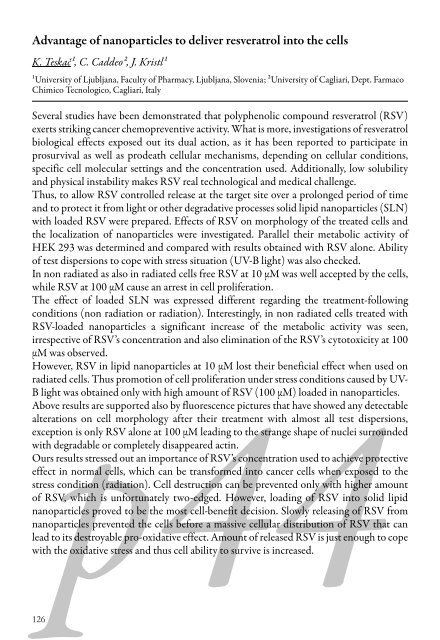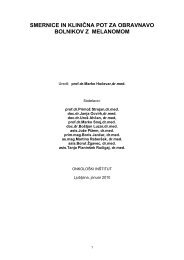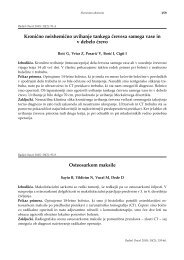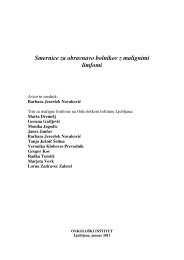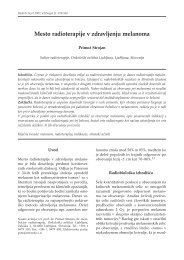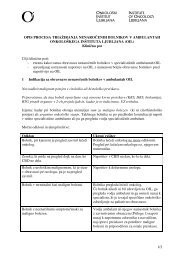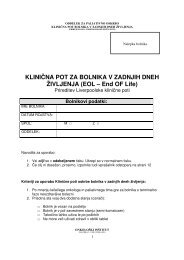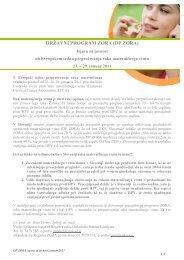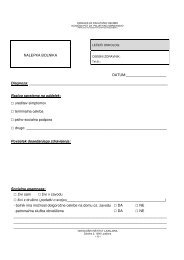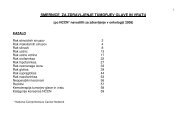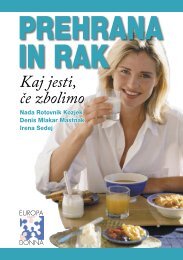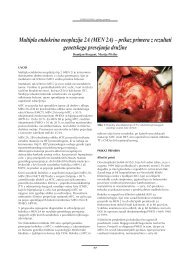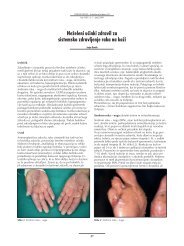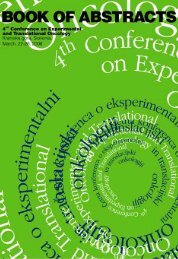You also want an ePaper? Increase the reach of your titles
YUMPU automatically turns print PDFs into web optimized ePapers that Google loves.
Advantage <strong>of</strong> nanoparticles to deliver resveratrol into the cells<br />
K. Teskač1, C. Caddeo2, J. Kristl1<br />
1University <strong>of</strong> Ljubljana, Faculty <strong>of</strong> Pharmacy, Ljubljana, Slovenia; 2University <strong>of</strong> Cagliari, Dept. Farmaco<br />
Chimico Tecnologico, Cagliari, Italy<br />
Several studies have been demonstrated that polyphenolic compound resveratrol (RSV)<br />
exerts striking cancer chemopreventive activity. What is more, investigations <strong>of</strong> resveratrol<br />
biological effects exposed out its dual action, as it has been reported to participate in<br />
prosurvival as well as prodeath cellular mechanisms, depending on cellular conditions,<br />
specific cell molecular settings and the concentration used. Additionally, low solubility<br />
and physical instability makes RSV real technological and medical challenge.<br />
Thus, to allow RSV controlled release at the target site over a prolonged period <strong>of</strong> time<br />
and to protect it from light or other degradative processes solid lipid nanoparticles (SLN)<br />
with loaded RSV were prepared. Effects <strong>of</strong> RSV on morphology <strong>of</strong> the treated cells and<br />
the localization <strong>of</strong> nanoparticles were investigated. Parallel their metabolic activity <strong>of</strong><br />
HEK 293 was determined and compared with results obtained with RSV alone. Ability<br />
<strong>of</strong> test dispersions to cope with stress situation (UV-B light) was also checked.<br />
In non radiated as also in radiated cells free RSV at 10 μM was well accepted by the cells,<br />
while RSV at 100 μM cause an arrest in cell proliferation.<br />
The effect <strong>of</strong> loaded SLN was expressed different regarding the treatment-following<br />
conditions (non radiation or radiation). Interestingly, in non radiated cells treated with<br />
RSV-loaded nanoparticles a significant increase <strong>of</strong> the metabolic activity was seen,<br />
irrespective <strong>of</strong> RSV’s concentration and also elimination <strong>of</strong> the RSV’s cytotoxicity at 100<br />
μM was observed.<br />
However, RSV in lipid nanoparticles at 10 μM lost their beneficial effect when used on<br />
radiated cells. Thus promotion <strong>of</strong> cell proliferation under stress conditions caused by UV-<br />
B light<br />
p44<br />
was obtained only with high amount <strong>of</strong> RSV (100 μM) loaded in nanoparticles.<br />
Above results are supported also by fluorescence pictures that have showed any detectable<br />
alterations on cell morphology after their treatment with almost all test dispersions,<br />
exception is only RSV alone at 100 μM leading to the strange shape <strong>of</strong> nuclei surrounded<br />
with degradable or completely disappeared actin.<br />
Ours results stressed out an importance <strong>of</strong> RSV’s concentration used to achieve protective<br />
effect in normal cells, which can be transformed into cancer cells when exposed to the<br />
stress condition (radiation). Cell destruction can be prevented only with higher amount<br />
<strong>of</strong> RSV, which is unfortunately two-edged. However, loading <strong>of</strong> RSV into solid lipid<br />
nanoparticles proved to be the most cell-benefit decision. Slowly releasing <strong>of</strong> RSV from<br />
nanoparticles prevented the cells before a massive cellular distribution <strong>of</strong> RSV that can<br />
lead to its destroyable pro-oxidative effect. Amount <strong>of</strong> released RSV is just enough to cope<br />
with the oxidative stress and thus cell ability to survive is increased.<br />
126


